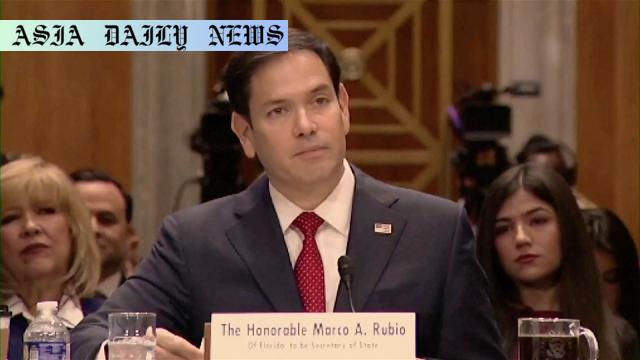Marco Rubio becomes the first Cabinet nominee of Trump’s administration to be confirmed by the Senate.

US Senate Confirms Marco Rubio as Secretary of State
Introduction
On Monday, the United States Senate unanimously confirmed Marco Rubio as the new secretary of state under President Donald Trump’s administration. This significant development marks the first Cabinet-level confirmation of President Trump’s tenure and reflects bipartisan support for Rubio. Born to Cuban immigrant parents and previously serving as a Senator for Florida, Rubio’s ascension to this role underscores his prominent place in American politics.
Marco Rubio’s Background
Marco Rubio, a Cuban-American politician, has made a name for himself as a strong advocate for human rights and a fierce critic of China’s policies. Representing Florida as a senator since 2011, Rubio was known for his focus on foreign policy, immigration reform, and national security. His heritage, being the son of Cuban immigrants, has informed much of his perspective on global and domestic issues, particularly in advocating for democracy and freedom in authoritarian regimes.
A Unanimous Confirmation
The Senate’s overwhelming support for Rubio, evident in the unanimous confirmation vote, highlights the bipartisan consensus on his qualifications. Rubio’s confirmation hearings featured pointed discussions on pressing global affairs, particularly his stance against China. On January 15, during his hearing, Rubio strongly criticized Beijing’s human rights abuses and pledged to maintain a firm policy to hold authoritarian regimes accountable. His hardliner stance seemed to resonate with lawmakers, paving the way for a smooth confirmation process.
Implications for US Foreign Policy
As the newly confirmed secretary of state, Rubio is positioned to play a central role in shaping American diplomacy during a pivotal time. His tenure is expected to emphasize human rights, democracy, and security in the context of growing geopolitical tensions. Rubio’s tough posture on China aligns with broader calls within Washington to counter Beijing’s influence globally, an approach that could redefine US relations with international powerhouses and allies alike.
Engagement with Global Leaders
In his first days as secretary of state, Rubio is expected to meet with foreign dignitaries convening in Washington for President Trump’s inauguration events. Among these will be Japan’s Foreign Minister Iwaya Takeshi, signaling early diplomatic engagements in the Asia-Pacific region. These meetings will likely set the tone for Rubio’s approach to fostering alliances, addressing mutual concerns, and promoting US strategic interests abroad.
Bipartisan Support and Criticism
While Rubio received unanimous support during his confirmation, opinions on his aggressive foreign policy approach may diverge over time, particularly regarding US relations with China and Russia. His emphasis on hardline tactics could prompt concerns over the potential for escalating tensions, even as others commend his commitment to defending human rights and democratic values. Balanced diplomacy will be key to navigating these complex international dynamics.
Conclusion
Marco Rubio’s confirmation as secretary of state marks a significant moment in US politics, with potential ripple effects on the country’s foreign policy trajectory. As a seasoned policymaker with a clear focus on addressing global challenges, Rubio is well-positioned to lead the US State Department during a transformative time. His actions in the coming years, especially his handling of key global relationships, will be closely scrutinized as he seeks to implement his vision for a safer, freer, and more prosperous world.
Commentary
Reflections on Marco Rubio’s Confirmation as Secretary of State
Significance of the Senate Unanimity
The unanimous confirmation of Marco Rubio as secretary of state is a notable achievement. In a time of partisan divides, it is refreshing to see bipartisan cooperation in affirming a leader for one of the most critical roles in the federal government. This points to Rubio’s broad qualifications and respect across the political spectrum, indicative of his unique ability to lead in times of domestic and international challenges.
The Challenges Ahead
Assuming the position of secretary of state is no small feat. Rubio faces a wide range of pressing issues, including balancing relations with allies, confronting authoritarian regimes, and preserving US influence globally. His tough stance on China signals a foreign policy approach that prioritizes human rights and countering oppressive regimes, but it will require careful execution to avoid unintended international conflicts or economic disruptions.
A Historical Moment
Rubio’s appointment as the first confirmed Cabinet member of the Trump administration adds a historical dimension to his role. As a Cuban-American with deep personal ties to the immigrant experience, he brings a unique perspective to US diplomacy. This perspective could play a key role in bridging divides and fostering dialogue with nations navigating their own cultural and political crossroads, underscoring the importance of principled leadership in foreign affairs.
Ultimately, Rubio’s tenure will be shaped by his ability to handle complex global dynamics while staying true to his principles. His confirmation is a promising start, but the true test lies in his capacity to effect meaningful and strategic change on the world stage.


